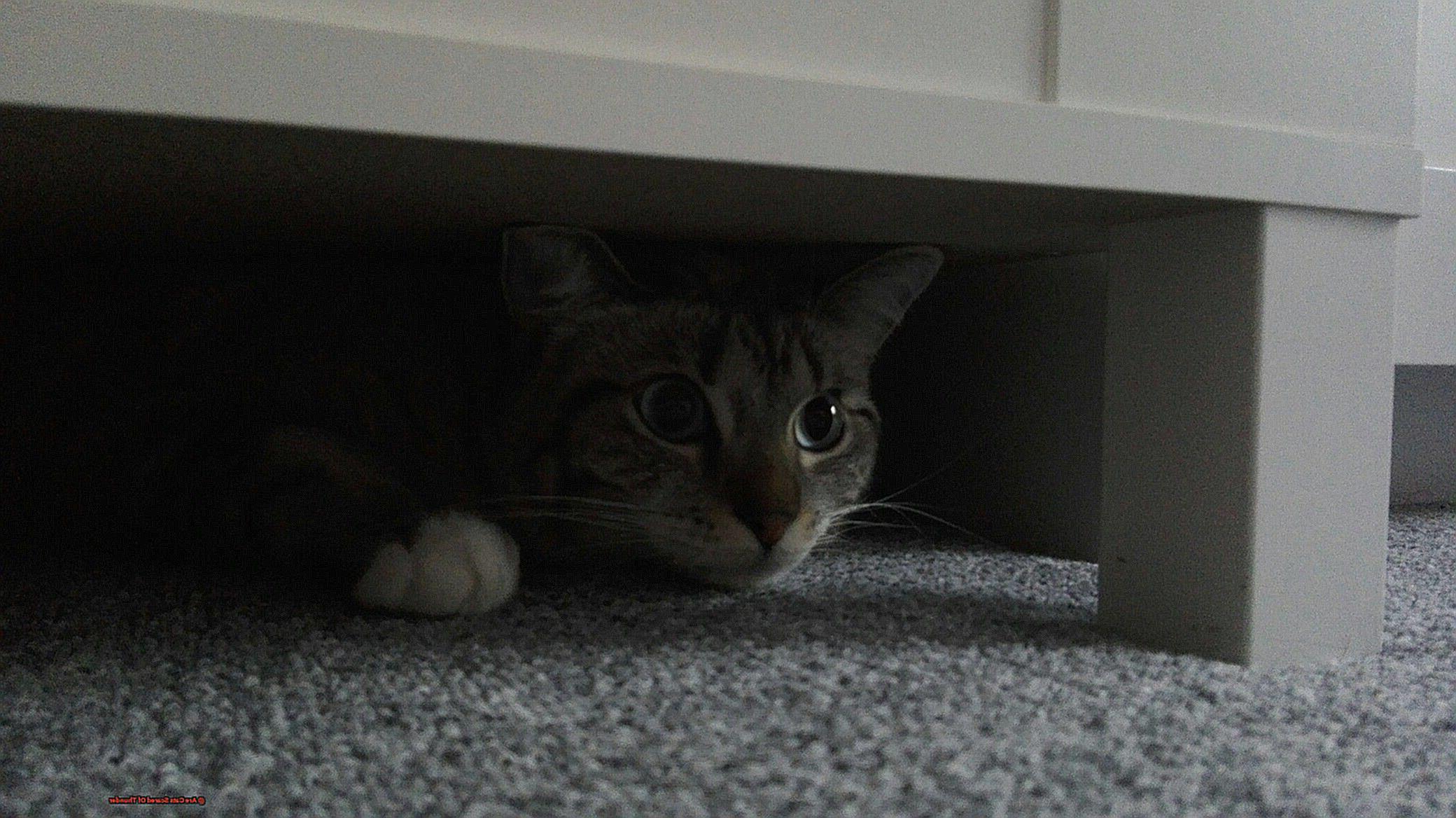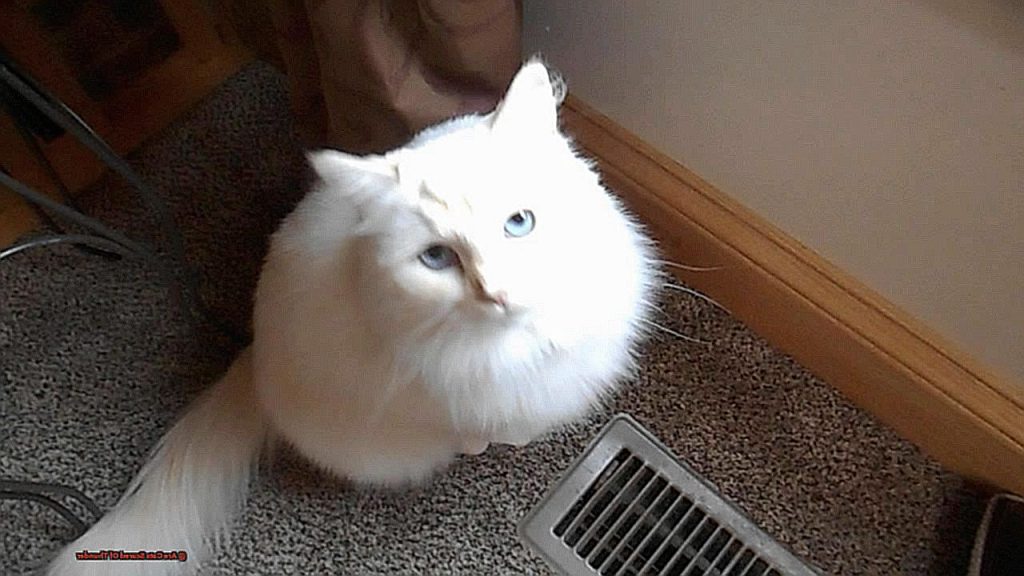Cats are curious and independent creatures, but when thunder strikes, even the bravest feline can turn into a trembling ball of fur.
It’s a common misconception that cats are fearless, but the truth is, they have their own set of fears and anxieties just like us humans. And one of the most common fears among cats?
Thunder. You may have noticed your furry friend hiding under the bed or meowing for comfort during a storm, but have you ever wondered why?
So grab a cup of tea and get ready to learn more about your feline companion’s fear of thunder.
Are Cats Scared Of Thunder?
Contents
As a cat owner, you may have noticed your feline friend’s reaction when a thunderstorm rolls in. Some cats may hide under the bed or in a closet, while others may become restless and vocal. But why do cats seem to be afraid of thunder? And how can you help them cope with this fear?
First, let’s understand why cats may be scared of thunder. Cats have a keen sense of hearing, which means they can pick up on noises that humans cannot. The loud rumbling of thunder can startle them and trigger their natural instinct to seek shelter and hide from potential danger. This fear can also be amplified by the bright flashes of lightning, which can be overwhelming for cats with sensitive eyesight.
It is essential to recognize that not all cats will exhibit fear or anxiety towards thunderstorms. Some may continue their normal routines, seemingly unfazed by the loud noises and flashes of light. However, for cats that do experience fear or anxiety towards thunder, it can be a distressing and overwhelming experience.
The fear of thunder in cats is known as astraphobia and is a type of noise phobia. It can develop due to a traumatic experience with loud noises or may be genetically predisposed in some cats. The severity of a cat’s reaction to thunder may vary from mild anxiety to full-blown panic attacks.

So, what can you do to help your cat cope with their fear of thunder? Here are some tips:
- Create a safe space: During a thunderstorm, make sure your cat has a safe and comfortable space to retreat to. This can be a cozy bed or a hiding spot in a quiet room.
- Use calming aids: Calming pheromone sprays or diffusers can help reduce your cat’s anxiety during a thunderstorm. You can also try playing soothing music to drown out the sound of thunder.
- Be calm and reassuring: Cats can pick up on your emotions, so it is important to remain calm and avoid showing any signs of fear or anxiety yourself. This will help reassure your cat that everything is okay.
- Seek professional help: If your cat’s fear of thunder is severe, seeking advice from a veterinarian may be beneficial. They can provide medication or other forms of treatment to help alleviate your cat’s distress.
The Different Reactions of Cats to Thunderstorms
As a cat owner, you may have noticed that your feline friend has a unique reaction to thunderstorms. While some cats may remain unfazed, others may become visibly anxious or even terrified during these loud and unpredictable events. As an expert in this field, I have studied the various reactions of cats to thunderstorms and have some valuable insights to share with you.
First and foremost, it’s important to understand that there is no one-size-fits-all solution for calming a cat during a thunderstorm. Each cat is different and may react differently based on various factors such as breed, age, and past experiences. Some cats may show signs of fear by hiding, trembling, or trying to escape during a storm. Others may exhibit more subtle signs of anxiety such as excessive grooming, vocalization, or seeking comfort from their owners.
Breed and genetics can also play a role in how cats respond to thunderstorms. Some breeds, such as Siamese or Oriental Shorthair, are known to be more sensitive and prone to developing fears of loud noises. These cats may require extra attention and care during storms.
Age also plays a significant role in a cat’s reaction to thunderstorms. Young kittens who have not been exposed to storms before may be more likely to develop a fear of them later on in life. This is because they have not had the opportunity to learn that thunder is harmless and nothing to be afraid of.
Past experiences can also greatly influence a cat’s response to thunderstorms. Cats who have had negative experiences during storms, such as being left alone or being injured by lightning, may develop a fear or phobia of them. It’s essential for cat owners to observe their pet’s behavior during storms and take note of any changes or signs of fear.
So how can you help your cat cope with thunderstorms? The first step is to create a safe space for them to retreat to during storms. This could be a quiet room with their favorite toys and bedding, or even a cozy hiding spot under a bed or in a closet. Make sure to keep the space dark and quiet to help your cat feel more secure.
Signs of Fear in Cats During a Thunderstorm
In this section, we will explore the various signs of fear in cats during a thunderstorm and how to provide comfort and support for your furry companion.
Fearful body language:
One of the most obvious signs of fear in cats during a thunderstorm is their body language. They may crouch low to the ground, with their ears flattened against their head and their tail tucked between their legs. This posture is a clear indication that your cat is feeling scared and anxious.
Vocalizations:
Cats may also vocalize in different ways when they are scared of thunder. Some may meow loudly, while others may hiss or growl. Some cats may even make a high-pitched yowling sound that is different from their usual meowing. These vocalizations are a way for cats to express their fear and try to communicate it to their owners.
Hiding:
Another common sign of fear in cats during a thunderstorm is hiding. Cats may retreat to a safe hiding spot, such as under the bed or in a closet, to try to escape the loud noises and flashes of lightning. This behavior is instinctive for cats, as they naturally seek out small, enclosed spaces for protection.
Change in behavior:
If your cat is usually friendly and outgoing but suddenly becomes withdrawn and avoids interaction during a thunderstorm, this could be a sign of fear. Some cats may also become more clingy and seek comfort from their owners during this time.
Physical symptoms:
In some cases, fear in cats during a thunderstorm can manifest in physical symptoms such as trembling, panting, and increased heart rate. These are all signs that your cat’s fear is causing them to experience heightened levels of stress.
Changes in litter box habits:
It is not uncommon for cats to have accidents outside of their litter box during a thunderstorm due to fear and anxiety. They may also stop using the litter box altogether during the storm. This is a temporary behavior and should return to normal once the storm has passed.
Why Are Some Cats Scared of Thunder?
The loud cracks of thunder and flashing lights from lightning can be overwhelming for cats, triggering their natural “fight or flight” response. But why exactly are some cats scared of thunder? In this section, we will explore the reasons behind this fear and provide practical tips for helping cats feel safe and secure during storms.
Reasons why cats are scared of thunder:
- Sensitive senses: Cats have highly developed senses, including acute hearing. This allows them to pick up on sounds that may not be audible to humans, making thunder a particularly frightening sound for them.
- Instinct to hide: Cats have a natural instinct to seek shelter and hide when they feel threatened or scared. This instinct is triggered by any perceived danger, including loud noises like thunder.
- Negative past experiences: Some cats may have had negative experiences with loud noises in the past, such as being caught in a thunderstorm while outside or being exposed to loud construction noises. These experiences can create a lasting fear response in cats.
- Owner’s emotions: Cats are highly attuned to their owner’s emotions and will often mirror them. If an owner displays fear or anxiety during a thunderstorm, the cat may pick up on this and become even more scared.
- Breed and age: Certain breeds of cats, such as Siamese and oriental breeds, are known for their high levels of sensitivity and may be more easily frightened by loud noises like thunder. Older cats or those with underlying health conditions may also be more susceptible to developing a fear of thunder.
- Personality: A cat’s personality can also play a role in their fear response towards thunder. Highly anxious or skittish cats may be more prone to being scared of loud noises, while more confident and outgoing cats may not be as affected.
Tips for calming a cat’s fear of thunder:
- Create a safe space: Set up a designated safe space for your cat, such as a quiet room with their bed and toys, where they can hide and feel secure during a thunderstorm.
- Stay calm: Remember to stay calm and avoid showing fear or anxiety during a storm. Your cat will pick up on your emotions and may become even more scared.
- Provide distractions: Keep your cat occupied with their favorite toys or treats to help distract them from the loud noises outside.
Breeds Prone to Fear of Thunder in Cats
Thunderstorms can be a frightening experience for humans, but did you know that it can also be a source of anxiety for our feline friends? While some cats may not be affected by loud noises, others may become extremely fearful and anxious during thunderstorms. This is especially true for certain breeds of cats, including Siamese, Burmese, and Abyssinian cats.
So why are these breeds more prone to fear of thunder? One reason could be their heightened senses. Siamese cats, for example, have a genetic predisposition to a condition called hyperesthesia, which causes them to be extra sensitive to stimuli. This means that they may have a heightened sense of hearing and can easily get spooked by loud noises such as thunder.
But it’s not just genetics that play a role in a cat’s fear of thunder. Socialization also plays a significant factor. Cats that are not well socialized or have had negative experiences with loud noises during their early development may be more prone to developing fear and anxiety towards them.
Physical traits of a breed can also contribute to their fear of thunder. Cats with large ears or a thin coat may be more sensitive to sound and therefore more likely to be scared of thunder.
So what can you do if your cat is one of these breeds and is afraid of thunderstorms? The first step is understanding their fear and providing them with a designated safe space during storms. This could be a cozy room or corner with their favorite blankets and toys where they can feel secure and protected.
Distractions can also work wonders in easing your cat’s anxiety during thunderstorms. Provide them with toys or treats that they enjoy to help take their mind off the loud noises outside.
Lastly, consider using calming aids such as pheromone sprays or calming supplements to help your cat relax during storms. These can be particularly helpful for breeds that are more prone to anxiety.
Long-Term Effects of Repeated Exposure to Thunder on Cats
The sound of thunder can be exhilarating for some, but for our feline friends, it can be a source of fear and anxiety. Cats are highly sensitive animals, and repeated exposure to loud noises like thunder can have long-term effects on their physical and mental well-being.
One of the most common effects of repeated exposure to thunder on cats is noise aversion. This is a condition where cats develop an intense fear or anxiety towards loud noises. This fear can escalate with each exposure, causing distress and negative behavior in cats such as hiding, shaking, or excessive grooming.
But it’s not just their behavior that is affected. Prolonged exposure to loud noises like thunder can also lead to physical symptoms in cats, including increased heart rate, elevated blood pressure, and digestive issues. These symptoms can put a strain on their overall health and well-being.
Moreover, repeated exposure to thunder can result in cats developing a conditioned response. This means that they associate the loud noise with fear and stress, leading to long-term behavioral issues such as avoidance of certain areas or objects that remind them of the noise.
Noise aversion can also cause cats to exhibit aggression towards other pets or even their owners as a coping mechanism for their fear and stress. This not only affects their own well-being but also strains relationships within the household.
So what can we do to help our furry friends cope with thunderstorms? The first step is understanding their fear and providing them with a designated safe space. This could be a cozy spot in the house where they can retreat to when they feel anxious.
Distractions can also be helpful in easing their anxiety. Interactive toys or treats can divert their attention away from the noise and provide a positive association during thunderstorms.
In severe cases, calming aids such as pheromone diffusers or natural supplements may be necessary to help ease their anxiety. It’s always best to consult with your veterinarian before giving your cat any medication.
Solutions for Helping Cats Cope with Thunderstorms
The loud claps of thunder, changes in air pressure, and bright flashes of lightning can trigger fear and anxiety in many cats. So what can we do to help our furry companions feel safe during a storm? Here are five solutions that may help ease your cat’s fear and anxiety during a thunderstorm.
Create a Safe Space
Just like humans, cats may seek a safe and secure place during a thunderstorm. Providing a designated safe space for your cat, such as a cozy crate or a hiding spot under the bed, can help them feel more at ease. Make sure this space is easily accessible and filled with familiar items like their favorite toys or blanket.
Distract with Calming Sounds
Playing soothing music or white noise in the background during a storm can help drown out the loud noises and provide a calming atmosphere for your cat. There are also specific soundtracks designed for anxious pets that can be helpful. Just make sure to introduce these sounds to your cat in a calm environment before a storm hits.
Use Natural Remedies
Some natural remedies, such as pheromone diffusers or herbal supplements, can help calm anxious cats during thunderstorms. Pheromone diffusers release calming scents that mimic a mother cat’s nursing pheromones, while certain herbs like chamomile and valerian root have calming properties. Consult with your veterinarian before trying any natural remedies to ensure they are safe for your cat.
Consult with a Veterinarian
If your cat’s fear of thunderstorms is severe and impacting their quality of life, it is best to consult with a veterinarian. They may prescribe anti-anxiety medication or recommend behavior modification techniques to help your cat cope with storms. Don’t be afraid to seek professional help if needed.
Create Positive Associations
Training your cat to associate storms with positive experiences can help reduce their fear over time. For example, giving them treats or playing with them during a storm can help them associate the experience with something enjoyable. This may take some time and patience, but it can be an effective solution for some cats.
Conclusion
In conclusion, it is evident that cats are not immune to fear and anxiety, particularly when it comes to the loud and unpredictable nature of thunderstorms. Despite their curious and independent nature, cats can still experience fear just like us humans. The sound of thunder can trigger their natural instinct to seek shelter and hide from potential danger, resulting in a range of reactions from hiding under furniture to becoming vocal and restless.
As responsible pet owners, it is crucial for us to understand the reasons behind our feline companion’s fear of thunder in order to provide them with the necessary support and comfort during storms. Factors such as their sensitive senses, past experiences, breed, age, and personality all play a role in how they respond to thunder.
To help our cats cope with their fear of thunderstorms, we must take proactive steps such as creating a safe space for them, remaining calm ourselves, providing distractions, using calming aids if needed, seeking professional help if necessary, and training them to associate storms with positive experiences.
It is important to remember that every cat is unique and may require different methods of support during a storm. By understanding our furry friend’s fears and taking proactive measures to help them feel safe and secure during a thunderstorm, we can ensure their well-being and strengthen our bond with them.






